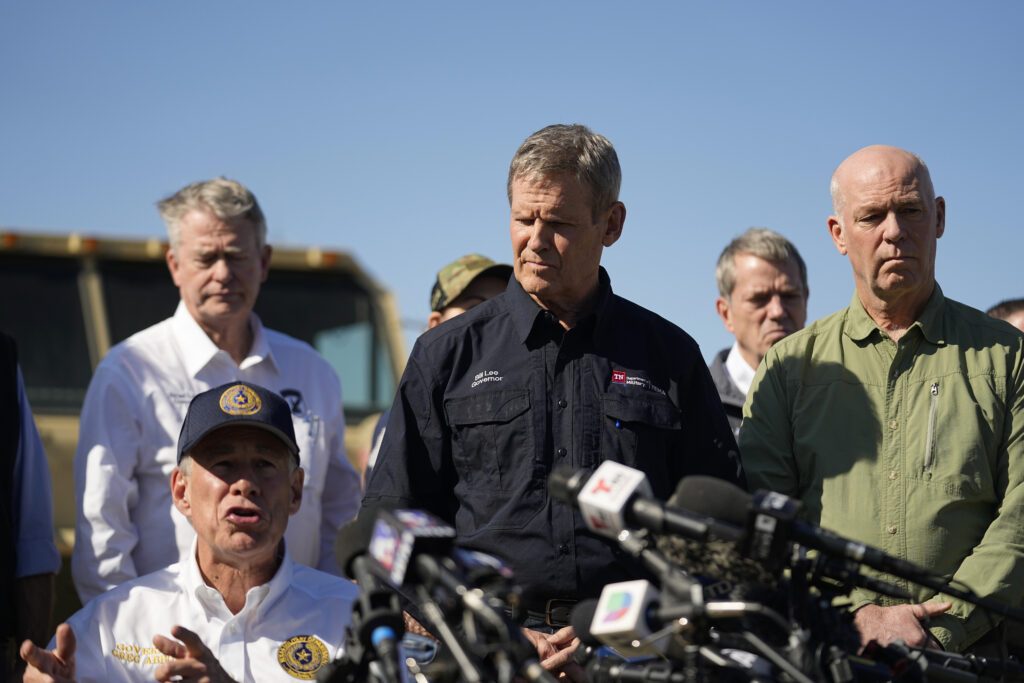
Gov. Bill Lee has returned from a weekend trip to Eagle Pass, Texas. The border town is where the current legal battle between state and federal authorities over razor wire began — and where more than 125 Tennessee National guardsmen are currently deployed.
“We are prepared even today to send additional troops. I am working with the Texas Department of Military to do just that,” Lee said on Sunday at a meeting with 14 other Republican governors.
Lee has committed to sending two more waves of Tennessee National Guard troops to Texas in support of Gov. Greg Abbott’s border control efforts. The first of those two groups is expected to deploy to the border within 60 days.
Last month, the U.S. Supreme Court ordered Texas to let federal agents cut down razor wire blocking them from portions of the state’s border with Mexico. The state’s governor, Greg Abbott, responded by announcing he would order the Texas National Guard to install more razor wire, with the goal of deterring asylum-seekers from crossing the border illegally.
Now, Republican governors across the country — including Lee — have stepped in to support Abbott.
Robert Barsky, an expert on migration and refugee law at Vanderbilt University, said he’s skeptical that there is any real legal basis for this kind of resistance to a U.S. Supreme Court order.
“It’s clearly illegitimate, constitutionally,” Barsky said.
Over the past few weeks, Abbott has repeatedly described immigrants and asylum-seekers as “invaders.” The Republican Governors Association, which Lee leads, also put out a statement specifically citing Texas’ right to self-defense.
Republican Governors Band Together, Issue Joint Statement Supporting Texas’ Constitutional Right to Self-Defense ⬇️https://t.co/PdDTUeZB69
— The RGA (@GOPGovs) January 25, 2024
That language is key. The United States Constitution and past Supreme Court cases, like Arizona v. United States (2012), give the federal government power over immigration law and border control, but a clause in the Constitution gives states the right to defend themselves. However, Barsky said, that’s only under specific circumstances.
“If the federal government cannot arrive in time, if there was an invasion, then the states can resist this invasion. That’s clear historically,” he said. “But much more important — and much more important to me — is the idea that immigrants coming to the U.S. do not and never do constitute an invasion. That is entirely incorrect.”
The current power struggle over who controls the border is rooted in an interpretation of the Constitution called “compact theory,” Barsky said.
“The resistance on the part of the Republican governors is based on this idea that the Constitution was cobbled together on the basis of a compact between states and that the states can opt out or defy certain federal laws if they so desire,” he said, “That is a very dubious claim.”
Compact theory has been repeatedly rejected in Supreme Court rulings.
At the end of the day, Barsky said he believes the current drama at the border is a political stunt designed to stoke fears about immigration ahead of elections this fall. But, he added that it could still have real-world consequences — especially for people seeking asylum in the United States.
“It makes sense as a strategy, as it were. But it’s being done on the backs of human beings. It’s being done with violence and with wanton disregard for the Constitution,” he said.
Multiple migrants, including a mother and her two children, have died while attempting to cross the border near Eagle Pass with border patrol agents unable to reach them because of barriers erected by state authorities. Many more have been badly injured by razor wire.
Barsky pointed out that crossing the border illegally is a misdemeanor, and that all people have a right to apply for asylum in the United States under both domestic and international law.
“What is happening at the border is that this misdemeanor is being punished by horrifying injury and death,” he said.
That worries Barsky more than Republican governors’ resistance to the Supreme Court’s order.
“It is extremely worrisome that states think that they can just go their own way. It’s unconstitutional. It violates the very principles upon which this country was built. And that’s very much the legal argument. I always come back, however, to the human argument. What are we willing to do to people?”

